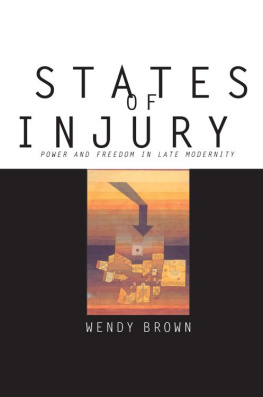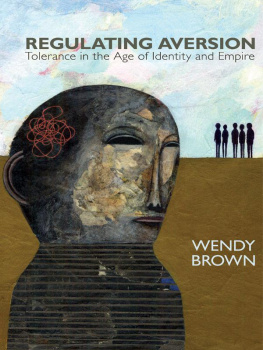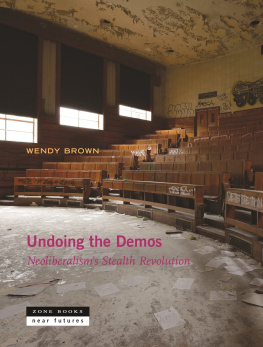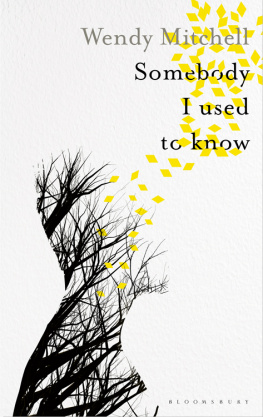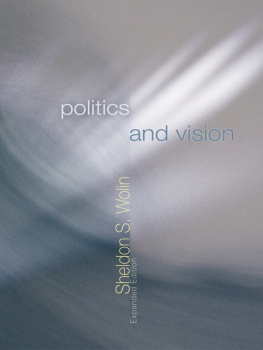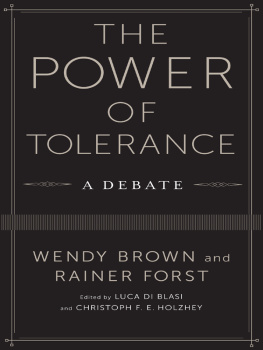Wendy Brown - States of Injury
Here you can read online Wendy Brown - States of Injury full text of the book (entire story) in english for free. Download pdf and epub, get meaning, cover and reviews about this ebook. year: 2020, publisher: Princeton University Press, genre: Politics. Description of the work, (preface) as well as reviews are available. Best literature library LitArk.com created for fans of good reading and offers a wide selection of genres:
Romance novel
Science fiction
Adventure
Detective
Science
History
Home and family
Prose
Art
Politics
Computer
Non-fiction
Religion
Business
Children
Humor
Choose a favorite category and find really read worthwhile books. Enjoy immersion in the world of imagination, feel the emotions of the characters or learn something new for yourself, make an fascinating discovery.
- Book:States of Injury
- Author:
- Publisher:Princeton University Press
- Genre:
- Year:2020
- Rating:3 / 5
- Favourites:Add to favourites
- Your mark:
- 60
- 1
- 2
- 3
- 4
- 5
States of Injury: summary, description and annotation
We offer to read an annotation, description, summary or preface (depends on what the author of the book "States of Injury" wrote himself). If you haven't found the necessary information about the book — write in the comments, we will try to find it.
States of Injury — read online for free the complete book (whole text) full work
Below is the text of the book, divided by pages. System saving the place of the last page read, allows you to conveniently read the book "States of Injury" online for free, without having to search again every time where you left off. Put a bookmark, and you can go to the page where you finished reading at any time.
Font size:
Interval:
Bookmark:
States of Injury
States of Injury
POWER AND FREEDOM IN
LATE MODERNITY
Wendy Brown
PRINCETON UNIVERSITY PRESS
PRINCETON, NEW JERSEY
Copyright 1995 by Princeton University Press
Published by Princeton University Press, 41 William Street,
Princeton, New Jersey 08540
In the United Kingdom: Princeton University Press,
Chichester, West Sussex
All Rights Reserved
Library of Congress Cataloging-in-Publication Data
Brown, Wendy.
States of injury : power and freedom in late modernity /
Wendy Brown.
p. cm.
Includes index.
ISBN 0-691-02990-3 (cloth : acid-free paper). ISBN 0-691-02989-X
eISBN: 978-0-691-20139-9
(pbk. : acid-free paper)
1. Political sciencePhilosophy. 2. Power (Social sciences).
3. Culture. 4. Feminist theory. 5. Liberty. I. Title.
JA74.B724 1995 303.3dc20 94-24068
R0
For Sheldon S. Wolin
ix
xv
THESE STUDIES consider how certain well-intentioned contemporary political projects and theoretical postures inadvertently redraw the very configurations and effects of power that they seek to vanquish. The topics explored in the course of this consideration include the liberal, capitalist, and disciplinary origins of the force of ressentiment in late modern political and theoretical discourse; the gendered characteristics of late modern state power and the paradoxical nature of appeals to the state for gender justice; the convergences of juridical and disciplinary power in contemporary efforts to procure rights along lines of politicized identity; and the gendered sexuality of liberal political discourse.
If the immediate provocation for each essay is a specific problem in contemporary political thought or activity, taken together these provocations provide an occasion of another sort: reflection on the present-day value of some of the last two centuries most compelling theoretical critiques of modern political life. Thus, the chapters on identity and morality in contemporary intellectual and political formations critically engage Nietzsche; the chapters on rights and liberalism reconsider Marxs critique of liberalism and Foucaults critique of regulation through individuation; the chapters concerned with state power are in dialogue with Weber, Foucault, and liberal thought; and the early Baudrillard is engaged to reflect on Catharine MacKinnons adaptation of Marx for a theory of gender.
Such a schema of the books objectives, however, involves a trick of retrospection that lends coherence to contingency when, in fact, like many works written in the dizzying intellectual and political pace of the late twentieth century, this one started and finished as quite different projects. Conceived in the mid-1980s as a critical feminist theory of late modern state power (now ), it quickly outgrew the confines established both by gender as a governing political concern and by the state as a delimitable domain of political power. From the outset, my interest in developing a feminist critique of the state was animated less by intrinsic fascination with the state than by concern over the potential dilution of emancipatory political aims entailed in feminisms turn to the state to adjudicate or redress practices of male dominance. Nor was my worry about such dilution limited to the politics of gender but rather engaged a larger question: What are the perils of pursuing emancipatory political aims within largely repressive, regulatory, and depoliticizing institutions that themselves carry elements of the regime (e.g., masculine dominance) whose subversion is being sought? Discerning the man in the state was thus a way to concentrate such a query on the problem of feminist political reform.
There was a certain disingenuousness, however, even to this formulation. Theorizing the state as a largely negative domain for democratic political transformation was not circumscribed by the states expressly gendered features, by its history and genealogy as mirror and accomplice of male dominance. Nor was the state the only domain of antidemocratic powers about which I thought feminists ought to be wary. Indeed, my own effort to deconstruct the state, to avoid the kind of reifications of that potent fiction to which theories of the state are so vulnerable, revealed an ensemble of familiar powers: the states gender could be traced in its mediations of capitalism, welfarism, and militarism, as well as in the specific liberal and bureaucratic discourses through which legislation, adjudication, policy execution, and administration transpire. But to argue that each of these dimensions of state power was problematic for feminist aims not only because it was inscribed with gender but because it carried generically antidemocratic tendencies betrayed both feminism and the state as having something of a metaphorical operation in my own political Weltanschauung. Feminism was being freighted with a strong democratic ambition, with aspirations for radical political freedom and equality, while the state was carrying the weight of all the discourses of power against which I imagined radically democratizing possibilities to be arrayed. While some feminists may be radical democrats, no ground exists for marking such a political posture as either indigenous or consequent to the diverse attachments traveling under feminisms name. Similarly, although the state may be an important site of convergence of antidemocratic discourses, it is hardly the only place where they make their appearance, nor always the best lens through which to study them. Discourses of sovereign individuality, or of bureaucratic depoliticization of gendered class relations, for example, can be discerned in the state but are not limited to operations there. Indeed, one of the richer sites of radical democratic agitation in the last decade, practices gathered under the rubric of cultural politics, is premised precisely on the notion that neither domination nor democratic resistance are limited to the venue of the state.
The confining qualities of gender and the state as categories of political analysis did not exhaust the sources undoing the feminist theory of the state project. The point of mapping the configurations of power in which contemporary democratic political opposition took shape was to understand where and how such opposition might do other than participate in contemporary orders of regulation, discipline, exploitation, and dominationin short, in existing regimes of unfreedom. But to pose the problem as one of negotiating these orders was to leave uninterrogated the question of the subject doing the negotiating; indeed, it was to assume that the politically committed subject sufficiently cognizant of the map of power would plot appropriate strategies and tactics given its aim of democratizing political life. What such an assumption eschews was the problem of subject formation by and through the very discourses being charted as sites and zones of unfreedom.
Nor was such neglect a minor matter: the viability of a radical democratic alternative to various political discourses of domination in the present is not determined only by the organization of institutional forces opposing that alternative but is shaped as well by political subjects desire for such an alternative. Even if, for example, feminists could be persuaded of the antidemocratic character of certain state-centered reforms, would they count this as an objection to such reforms? Even if the inscription of gendered, racial, or sexual identity in legal discourse could be shown to have the effect of reaffirming the historical injuries constitutive of those identities, thus installing injury as identity in the ahistorical discourse of the law, would proponents of such actions necessarily despair over this effect? To what extent have the particular antidemocratic powers of our time produced subjects, often working under the banner of progressive politics, whose taste for substantive political freedom is attenuated by a historically unique form of political powerlessness amid historically unprecedented discourses of individual liberty? And if this peculiar form of powerlessness is sometimes worn rather straightforwardly as the conservative raiment of despair, misanthropy, narrow pursuit of interest, or bargains of autonomy for state protection, when does it twist into a more dissimulated political discourse of paralyzing recriminations and toxic resentments parading as radical critique?
Next pageFont size:
Interval:
Bookmark:
Similar books «States of Injury»
Look at similar books to States of Injury. We have selected literature similar in name and meaning in the hope of providing readers with more options to find new, interesting, not yet read works.
Discussion, reviews of the book States of Injury and just readers' own opinions. Leave your comments, write what you think about the work, its meaning or the main characters. Specify what exactly you liked and what you didn't like, and why you think so.

